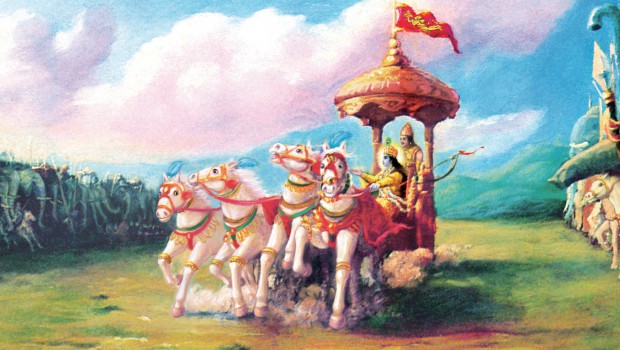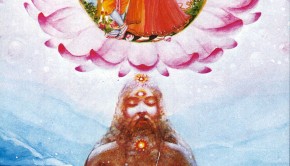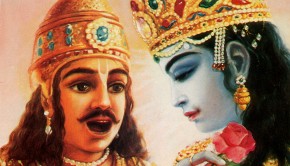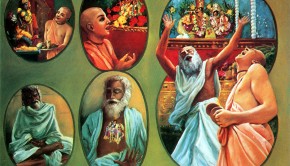Introduction To Bhagavad Gita Part One
The spirit of Bhagavad gita is mentioned in the Bhagavad gita itself. It is just like this. If we want to take a particular medicine, then we have to follow the particular direction mentioned on the label of the medicine. We cannot take the particular medicine according to our own direction or by the direction of a friend, but we have to take the medicine under the direction given on the label of the bottle and as directed by the physician
[New York, February 19, 1966 First Tape Recording, Done by Srila Prabhupada Himself]
Prabhupada:
jnananjana-salakaya
caksur unmilitam yena
tasmai sri-gurave namah
sri-caitanya-mano-‘bhistam
sthapitam yena bhu-tale
svayam rupah kada mahyam
dadati sva-padantikam
vande ‘ham sri-guroh sri-yuta-pada-kamalam sri-gurun vaisnavams ca
sri-rupam sagrajatam saha-gana-raghunathanvitam tam sa-jivam
sadvaitam savadhutam parijana-sahitam krsna-caitanya-devam
sri-radha-krsna-padan saha-gana-lalita-sri-visakhanvitams ca
he krsna karuna-sindho
dina-bandho jagat-pate
gopesa gopika-kanta
radha-kanta namo ‘stu te
tapta-kancana-gaurangi
radhe vrndavanesvari
vrsabhanu-sute devi
pranamami hari-priyevancha-kalpatarubhyas ca
krpa-sindhubhya eva ca
patitanam pavanebhyo
vaisnavebhyo namo namah
sri-krsna-caitanya
prabhu-nityananda
sri-advaita gadadhara
srivasadi-gaura-bhakta-vrnda
hare krsna hare krsna krsna krsna hare hare
hare rama hare rama rama rama hare hare
Introduction to Gitopanisad by A. C. Bhaktivedanta Swami, the author of Srimad-Bhagavatam, Easy Journey to Other Planets, editor of Back to Godhead, etc.
Bhagavad-gita is known also Gitopanisad, the essence of Vedic knowledge, and one of the most important of the various Upanisads in Vedic literature. This Bhagavad-gita, there are many commentations in English and what is the necessity of another English commentation of the Bhagavad-gita can be explained in the following way. One American lady, Mrs. Charlotte Le Blanc asked me to recommend an English edition of Bhagavad-gita which she can read. Of course, in America there are so many editions of English Bhagavad-gita, but so far I have seen them, not only in America but also India, none of them can be said strictly as authoritative because almost every one of them have expressed their own opinion through the commentation of the Bhagavad-gita without touching the spirit of Bhagavad-gita as it is.
The spirit of Bhagavad-gita is mentioned in the Bhagavad-gita itself. It is just like this. If we want to take a particular medicine, then we have to follow the particular direction mentioned on the label of the medicine. We cannot take the particular medicine according to our own direction or by the direction of a friend, but we have to take the medicine under the direction given on the label of the bottle and as directed by the physician. Similarly, the Bhagavad-gita also should be taken or accepted as it is directed by the speaker Himself. The speaker of the Bhagavad-gita is Lord Sri Krsna. He is mentioned in every page of the Bhagavad-gita as the Supreme Personality of Godhead, Bhagavan.
Of course, “bhagavan” is sometimes designated to any powerful person or any powerful demigod, but here bhagavan is certainly designated to Sri Krsna, a great personality, but at the same time we must know that Lord Sri Krsna, as He is confirmed by all the acaryas. . . I mean to say, even Sankaracarya, Ramanujacarya, Madhvacarya, Nimbarka Svami and Sri Caitanya Mahaprabhu and many others. In India there were many authoritative scholars and acaryas, I mean, authorities of the Vedic knowledge.
All of them, including Sankaracarya, has accepted Sri Krsna as the Supreme Personality of Godhead. The Lord Himself has also established Himself as the Supreme Personality of Godhead in the Bhagavad-gita. He is accepted so in the Brahma-samhita and all Puranas, especially in the Bhagavata Purana, krsnas tu bhagavan svayam. So therefore we should take Bhagavad-gita as it is directed by the Personality of Godhead Himself.
So in the Fourth Chapter of Bhagavad-gita the Lord says,
proktavan aham avyayam
vivasvan manave praha
manur iksvakave ‘bravit
[Bg. 4.1]evam parampara-praptam
imam rajarsayo viduh
sa kaleneha mahata
yogo nastah parantapa
[Bg. 4.2]
sa evayam maya te ‘dya
yogah proktah puratanah
bhakto ‘si me sakha ceti
rahasyam hy etad uttamam
[Bg 4.3]
The idea is the Lord said to Arjuna that “This yoga, this system of yoga, Bhagavad-gita, was first spoken by Me to the sun-god and the sun-god explained to Manu. Manu explained to Iksvaku, and in that way, by disciplic succession, one after another, this yoga system is coming, and in course of time this system is now lost. And therefore, I am speaking to you the very same yoga system again, the very same old yoga system of Bhagavad-gita, or Gitopanisad. Because you are My devotee and you are My friend, therefore it is possible for you only to understand.”
Now the purport is that Bhagavad-gita is a treatise which is specially meant for the devotee of the Lord. There are three classes of transcendentalists, namely the jnani, the yogi and the bhakta. Or the impersonalist or the meditator or the devotees. So here it is clearly mentioned, the Lord says to Arjuna that “I am speaking or I am making you the first man of the parampara. Because the old parampara or disciplic succession is now broken, therefore I wish to establish again another parampara in the same line of thought as it was coming down from the sun-god to others.
So you, you take it and you distribute it. Or the system, the yoga system of Bhagavad-gita may now be distributed through you. You become the authority of understanding Bhagavad-gita.” Now here is a direction that Bhagavad-gita is especially instructed to Arjuna, the devotee of the Lord, the direct student of Krsna. And not only that, he is intimately in touch with Krsna as friend. Therefore Bhagavad-gita is understood by a person who has similar qualities like Krsna. That means he must be a devotee, he must be in relation, direct relationship with the Lord.
As soon as one becomes a devotee of the Lord, he has a direct relationship also with the Lord. That is a subject matter very long, but briefly it can be stated that a devotee is in relationship with the Supreme Personality of Godhead in five ways. One may be a devotee in a passive state, one may be a devotee in active state, one may be a devotee as a friend, one may be a devotee as parent, and one may be a devotee as conjugal lover.
So Arjuna was a devotee in relationship with the Lord as a friend. The Lord can become a friend. Of course, this friendship and the conception of friendship which we have got in the mundane world, there is a gulf of difference. This is transcendental friendship which. . . Not that everyone will have the relationship with the Lord. Everyone has got a particular relationship with the Lord and that particular relationship is evoked by the perfection of devotional service.
At the present status of our life we have not only forgotten the Supreme Lord, but also we have forgotten our eternal relationship with the Lord. Every living being, out of many, many millions and billions of living beings, each and every living being has got a particular relationship with the Lord eternally. That is called svarupa. Svarupa. And by the process of devotional service one can revive that svarupa of oneself. And that stage is called svarupa-siddhi, perfection of one’s constitutional position. So Arjuna was a devotee and he was in touch with the Supreme Lord in friendship.
Now, this Bhagavad-gita was explained to Arjuna and how Arjuna accepted it? That should also be noted. How Arjuna accepted the Bhagavad-gita is mentioned in the Tenth Chapter. Just like
param brahma param dhama
pavitram paramam bhavan
purusam sasvatam divyam
adi-devam ajam vibhum
ahus tvam rsayah sarve
devarsir naradas tatha
asito devalo vyasah
svayam caiva bravisi me
[Bg. 10.12–13]
sarvam etad rtam manye
yan mam vadasi kesava
na hi te bhagavan vyaktim
vidur deva na danavah.
[Bg. 10.14]
Now, Arjuna says, after hearing Bhagavad-gita from the Supreme Personality of Godhead, he accepts Krsna as param brahma, the Supreme Brahman. Brahman. Every living being is Brahman, but the supreme living being or the Supreme Personality of Godhead is the Supreme Brahman or supreme living being. And param dhama. Param dhama means He is the supreme rest of everything. And pavitram. Pavitram means He is pure from material contamination. And He’s addressed as purusam. Purusam means the supreme enjoyer; sasvatam, sasvata means from very beginning, He’s the first person; divyam, transcendental; devam, the Supreme Personality of Godhead; ajam, never born; vibhum, the greatest.
Now one may doubt that because Krsna was the friend of Arjuna, therefore he might say all these things to his own friend. But Arjuna, just to drive out this kind of doubts in the mind of the readers of Bhagavad-gita, he establishes his proposition by the authorities. He says that Lord Sri Krsna is accepted as the Supreme Personality of Godhead not only by himself, Arjuna, but He is so accepted by authorities like Narada, Asita, Devala, Vyasa.
These personalities are great personalities in distributing the Vedic knowledge. They (are) accepted by all acaryas. Therefore Arjuna says that “Whatever You have spoken so far to me, I accept them as completely perfect.” Sarvam etad rtam manye [Bg. 10.14]. “I take it, I believe it that whatever You have spoken, they are all right. And Your Personality, Your Personality of Godhead, is very difficult to understand. And therefore You cannot be known by even the demigods. You cannot be known even by the demigods.” That means the Supreme Personality Godhead cannot be known even by greater personalities than the human being, and how a human being can understand Sri Krsna without becoming His devotee?
Therefore Bhagavad-gita should be taken up in a spirit of devotee of Lord Sri Krsna. One should not think that he is equal, on the same level of Sri Krsna, or one should not think that He is an ordinary personality, maybe a very great personality. No. Lord Sri Krsna is the Supreme Personality of Godhead. So at least theoretically, on the statement of Bhagavad-gita or on the statement, assertion of Arjuna, the person who is trying to understand the Bhagavad-gita, we should accept Sri Krsna as the Supreme Personality of Godhead, and then, with that submissive spirit. . . Unless one receives this Bhagavad-gita in a submissive spirit and aural reception, it is very difficult to understand Bhagavad-gita because it is a great mystery.
So in this Bhagavad-gita. . . We may survey what is this Bhagavad-gita. This Bhagavad-gita is meant for delivering persons, persons from the nescience of this material existence. Every man is in difficulty in so many ways, as Arjuna also was in difficulty in the matter of fighting the battle of Kuruksetra. And as such he surrendered unto Sri Krsna, and therefore this Bhagavad-gita was spoken. Similarly, not only Arjuna but every one of us is always full of anxieties due to our, this material existence. Asad-grahat. It is. . . Our existence is in the environment or atmosphere of nonexistence. But actually, we are not nonexistent. Our existence is eternal, but some way or other we are put into this asat. Asat means which does not exist.
Now out of so many human being who are actually inquiring about his position as to what he is, why he is put into this awkward position of suffering. . . Unless one is awakened to this position, that “Why I am suffering? I do not want all these sufferings. I have tried to make a solution of all these sufferings, but I have failed,” unless one is in that position, he is not to be considered a perfect human being. Humanity begins when this sort of inquiries are awakened in one’s mind.
In the Brahma-sutra this inquiry is called brahma-jijnasa. Athato brahma jijnasa. And every activity of the human being is to be considered a failure without having this inquiry in his mind. So persons who have awakened this inquiry into his mind as to “What I am, why I am suffering, wherefrom I have come or where I shall go after death,” when these inquiries come, are awakened in the mind of a sane human being, then he is practically the right student for understanding Bhagavad-gita. And he must be sraddhavan. Sraddhavan. He must have respect, a fond respect in the Supreme Personality of Godhead. Such a person, as the ideal person was Arjuna.
So Lord Krsna, He descends, yada yada hi dharmasya glanir bhavati [Bg. 4.7], just to establish the real purpose of life. When man forgets the real purpose of life, the mission of human form of life, then it is called dharmasya glanih, the disturbance of the occupation of human being. So in that circumstances, out of many, many human being, who awakens, one who awakens the spirit of understanding his position, for him this Bhagavad-gita is spoken. We are just like swallowed by the tigress of nescience, and Lord, being causelessly merciful upon the living entities, especially for the human being, He spoke Bhagavad-gita, making His friend Arjuna as the student.
Arjuna was certainly, being an associate of Lord Krsna, he was above all ignorance. But still, Arjuna was put into ignorance in the Battlefield of Kuruksetra just to question about the problems of life to the Supreme Lord so that the Lord can explain them for the benefit of future generation of human being to chalk out the plan of his life and act in that way so that his life, his mission of human life, can be perfect.
So in this Bhagavad-gita the subject matter is comprehending five different truths. The first truth is what is God. It is the preliminary study of the science of God. So that science of God is explained here. Next, the constitutional position of the living entities, jiva. Isvara and jiva. The Lord, the Supreme Lord, He is called isvara. Isvara means controller, and jiva, the living entities are. . . Jivas, the living entities, they are not isvara, or the controller. They are controlled. Artificially, if I say that “I am not controlled, I am free,” this is not the sign of a sane man.
A living being is controlled in every respect. At least, in his conditioned life he is controlled. So in this Bhagavad- gita the subject matter comprehends about the isvara, the supreme controller, and about the controlled living entities and prakrti, the nature, the material nature. And next, the time, or duration of existence of the whole universe, or this manifestation of the material nature, and the duration of time, or the eternal time, and karma. Karma means activity. Everything, the whole universe, whole cosmic manifestation is full of different activities. The living beings especially, they are all engaged in different activities. So we have to study from the Bhagavad-gita, isvara, what is God, jiva, what are these living entities, and prakrti, what is this cosmic manifestation, and how it is controlled by time, and what are these activities?
Now out of these five subject matter, in the Bhagavad-gita it establish that the Supreme Godhead or Krsna or Brahman or Paramatma. . . You may call whatever you like. But the supreme controller. There is a supreme controller. So the supreme controller is the greatest of all. And the living beings, they are in quality like the supreme controller. Just like the supreme controller, the Lord, He has control over the universal affairs, over the material nature, how the. . . It will be explained in the later chapters of Bhagavad-gita that this material nature is not independent. She is acting under the direction of the Supreme Lord.
Mayadhyaksena prakrtih suyate sa-caracaram [Bg. 9.10]. “This material nature is working under My direction,” mayadhyaksena, “under My superintendence.” So we, we are mistaken. When we see wonderful things happening in the cosmic nature, we should know that behind these wonderful manifestations, there is a controller. Nothing can be manifested without being controlled. It is childish to, not to consider about the controller. Just like a very nice motor car with very good speed and very good engineering arrangement is running on the street. A child may think that “How this motor car is running without the help of any horse or any pulling agent?” But a sane man or an elderly person, he knows that in spite of all engineering arrangements in the motor car, without the driver it cannot move. That engineering arrangement of a motor car, or in electric powerhouse. . . Now at the present moment it is the day of machinery, but we should always know that behind the machinery, behind the wonderful working of the machinery, there is a driver.
So the Supreme Lord is the driver, adhyaksa. He is the Supreme Personality under whose direction everything is working. Now these jiva, or the living entities, they have been accepted by the Lord in this Bhagavad-gita, as we’ll know it in later chapters, that they are parts and parcels of the Supreme Lord.
Mamaivamso jiva-bhutah [Bg. 15.7]. Amsa means parts and parcels. Now as a particle of gold is also particle, a drop of water of the ocean is also salty, similarly, we, the living entities, being part and parcels of the supreme controller, isvara, Bhagavan, or Lord Sri Krsna, we have got, I mean to say, qualitatively all the qualities of the Supreme Lord in minute. Because we are minute isvara, subordinate isvara. We are also trying to control. We are just trying to control over the nature. In the present days you are trying to control over the space. You are trying to float imitation planets. So this tendency of controlling or creating is there because partially we have got that controlling tendency. But we should know that this tendency is not sufficient. We have the tendency of controlling over the material nature, lording it over the material nature, but we are not the supreme controller. So that thing is explained in the Bhagavad-gita.
Then what is this material nature? The nature is also explained. The nature, material nature, is explained in the Bhagavad-gita as inferior, inferior prakrti. Inferior prakrti, and the living entities are explained as the superior prakrti. Prakrti means which is controlled, which is under. . . Prakrti, real meaning of prakrti is a woman or a female. Just like a husband controls the activities of his wife, similarly, the prakrti is also subordinate, predominated. The Lord, the Supreme Personality of Godhead, is the predominator, and this prakrti, both the living entities and the material nature, they are different prakrtis, or predominated, controlled by the Supreme. So according to Bhagavad-gita, the living entities, although they are parts and parcels of the Supreme Lord, they are taken as prakrti. It is clearly mentioned in the Seventh Chapter of the Bhagavad-gita yes, apareyam itas tu viddhi apara [Bg. 7.5]. This material nature is apara iyam. Itas tu, and beyond this there is another prakrti. And what is that prakrti? Jiva-bhuta, these. . .
So this prakrti, the constitution of this prakrti is constituted by three qualities: the mode of goodness, the mode of passion, and mode of ignorance. And above these modes, three different kinds of modes, goodness, passion, and, I mean to say, ignorance, there is eternal time. There is eternal time. And by combination of these modes of nature and under the control, under the purview of this eternal time, there are activities. There are activities, which is called karma. These activities are being done from time immemorial and we are suffering or enjoying the fruits of our activities. Just like in the present life also, we enjoy the activities, the fruits of our activities. Suppose I am a businessman and I have worked very hard with intelligence and I have amassed a vast amount of bank balance. Now I am the enjoyer. Similarly, suppose I started my business with a vast amount of money, but I failed to make a successful. . ., I lost all the money. So I am sufferer. So similarly, in every field of our life we enjoy, we enjoy the result of our work. This is called karma.
So these things, isvara, jiva, prakrti, or the Supreme Lord, or the living entity, the material nature, the eternal time, and our different activities, these things are explained in the Bhagavad-gita. Now out of these five, the Lord, the living entities, and the material nature and time, these four items are eternal. Now manifestation, manifestation of prakrti may be temporary, but it is not false. Some philosophers say that this manifestation of material nature is false, but according to the philosophy of Bhagavad-gita or according to the philosophy of the Vaisnavas, they do not accept the manifestation of the world as false. They accept that the manifestation is real, but it is temporary.
It is just like a cloud takes place in the sky and the rainy season begins, and after the rainy season there are so many new green vegetation all over the field, we can see. And as soon as the rainy season is finished, then the cloud is vanquished. Generally, gradually, all this vegetation dry up and again the land becomes barren. Similarly, this material manifestation takes place at a certain interval. We’ll understand it, we’ll know it, from the pages of the Bhagavad-gita. Bhutva bhutva praliyate [Bg. 8.19]. This manifestation becomes magnificent at a certain interval, and again it disappears. That is the work of the prakrti. But it is working eternally; therefore prakrti is eternal. It is not false. Because the Lord has accepted, mama prakrti, “My prakrti.” Apareyam itas tu viddhi me prakrtim param [Bg. 7.5]. Bhinna prakrti, bhinna prakrti, apara prakrti, this material nature is a separated energy of the Supreme Lord, and the living entities, they are also energy of the Supreme Lord, but they are not separated (contunued. . .















Hare Krishna Prabhuji.
It was a very nice experience. I felt I was really reading Srila Prabhupada’s books. It was so realistic and nice. Thank you very much for your kind efforts to enlighten the dull people like us.
Hari bol.
Hare Krsna Prabhu,
Prabhu, please consider replying this letter. I will not mind if you reply late.
I found a man who was speaking something about the Bhagavad-gita. I knew that these is not good to listen unauthorized commentation on the Bhagavad-gita but out of curiosity and my foolish judgement I anyhow listened to it and then the disaster happened. He spoke something from the BG7.20 and said that man of less intelligence surrender unto demigods and also dragged Krishna to that category to say that we should not worship Krishna rather ‘-someone-’ else. Worshipping Krishna is wrong and such things.He blasphened Krishna in so many ways that I was left completely disturbed.
I know that he is wrong neither Krishna said any such thing but still I am disturbed after hearing such things. His poisonous talks are reverberating in my mind.From a few months I have started to lose all my attraction to devotional service. I am just following the four regulative principles and I have lost my attraction to chanting too!
I cannot also defeat him. Because he is quoting from the Bhagavad-gita with lots of knowledge on word jugglery and I will also quote from the Bhagavad-gita but without any grammatical and language strength.
Prabhu, please give me some advice what should I do. I have no one else to share my problems in spiritual life except you.I have my friends, family and so many things-but all are against devotional service at the first place let alone solving or listening to my problems, they will only increase my problems more.
Please forgive me Prabhu, if I annoy you by asking so many questions. But I accept all your advice and instructions because I am sure you will not say anything different from what Srila Prabhupada said. Otherwise you would have been somewhere in F-ISKCON holding some very high post rather than struggling to protect Srila Prabhupada’s movement.
Hare Krishna Hrishikesh
Yes. It is a very disastrous thing. This is hearing from the Mayavadis. Mayavadis means envious of Krishna. They make a business on Bhagavad-gita and the other Vedic scriptures but they are envious of Krishna. They speak with great education and skill but the purpose of their speaking is to eliminate Krishna.
So it is a good experience, now you have practically experienced what happens when you hear from a Mayavadi.
But now you have to recover. Recover just means forcing yourself to chant the Hare Krishna mantra at least 16 rounds a day, even though you have lost all taste for chanting. It may be difficult for a while but we have to undergo that difficulty.
It is easy to chant Hare Krishna when we are very enlivened in Krishna consciousness but we have to vow to chant at least 16 rounds of the Hare Krishna mantra even if we find the chanting very difficult and we have no taste for chanting Hare Krishna.
So this is the solution to your problem. Force yourself to chant at least 16 rounds of the Hare Krishna mantra every day and listen to Srila Prabhupada’s lectures and read his books.
We should not hear from anyone unless we have first established they are a pure devotee of Krishna. At least we have to see they are in the disciplic succession, but even that is not enough as now mostly everyone is speaking so much nonsense in the name of Srila Prabhupada and Krishna. These are difficult times but we have to just keep on chanting Hare Krishna and reading Srila Prabhupada’s books and it will not be difficult for us.
Chant Hare Krishna and be happy!
Madhudvisa dasa
Hare Krsna Prabhu,
Yes Prabhu, you are right. It is indeed a very disastrous thing to hear from the mayavadis. Lord Caitanya has stressed so much not to hear from a mayavadi- I did not understand why did He say so. I thought they may say Krsna is formless or something like that but I never thought that they can drag Krsna to position of demigods, that too so professionally. They are not only envious of Krsna’s Personality but also of His Supreme position.
Everything Lord Caitanya said has been completely proved- my spiritual life actually became doomed, all my devotion has dried up. Now onwards I will take His instructions seriously and stop making any intellectual arrangement.
Madhudvisa dasa Ji,
Can you hear Krishna? I want to converse with Krishna to know why Krishna does whatever he does. If then I decide to make his purpose mine then I’ll surrender to him.
If suppose a person helps someone but then the helped person uses that help for harming the world or a person is harmed, that may create some reactions which are beneficial to the world. How a human with limited knowledge can decide what’s right or wrong? That’s why I’m interested in surrendering; or if I become omniscient then maybe I’ll be able to decide with surity that what’s best to do at each moment.
A person with limited knowledge can not decide what is right and what is wrong. We have to surrender to a bona fide spiritual master and hear from him. That is the only way we can get real knowledge. We can not get any real knowledge on our own strength.
I want to fly up like a phoenix bird?what does it mean
If you want to fly like a bird you can get a bird’s body in your next life. But that would be a great waste. Birds have very small brains and can not really take to Krishna consciousness. You should utilize this valuable form of human life properly and become Krishna conscious and go back home back to Godhead after you leave this material body…